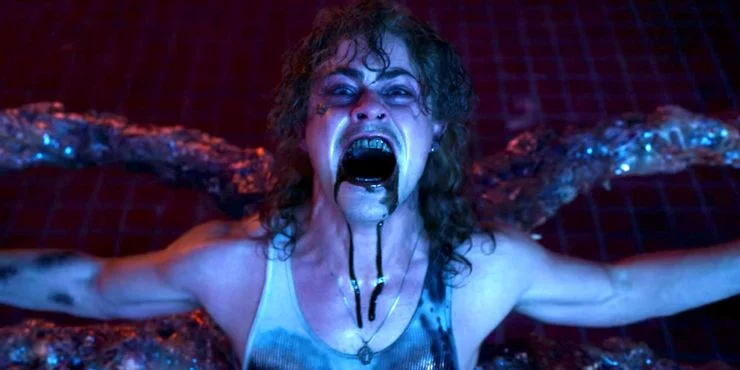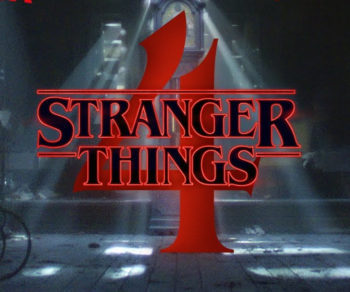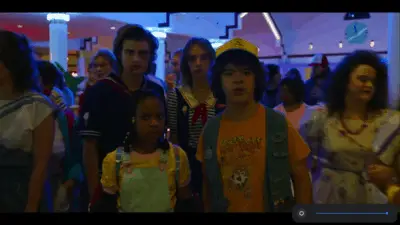
All evil must have a home…
But where is that home, and what is that evil? Does it exist in our minds? The real world? Both? Does it only have a home if we allow it? This is the essence of Stranger Things season 4 episode 4: “Dear Billy” where Max has to confront her unresolved issues with Billy’s passing, and how Vecna may represent our subconscious, past trauma, that we just can’t let go of.
In this review, we’ll break down “Dear Billy,” look at some more themes and connections, and point out any great 1980s references as we go.
If you want to catch up with previous reviews from Stranger Things season 4, you can check them out here:
“Dear Billy” Plot Summary
This is an episode that doesn’t even feature Eleven/Millie Bobby Brown, and one where Max/Sadie Sink does all the heavy lifting. Eleven is away training to restore her powers, but we see Max was in a trance at the end of episode 3. Does Vecna only seem to attack/latch onto people with a traumatic past? And is it crucial that that traumatic past is unresolved? Does this lack of resolution weaken a part of the brain that he can attach himself to?
Do those that hear the grandfather clock know that their time is up? But there is one man who seemed to beat this curse in a very Harry Potter/Voldemort way: Victor Creel. Also, why did Vecna appear in the 1950s, only to reappear 30 years later? Nancy and Robin are going to find out, and they take a trip to the Pennhurst Mental Hospital.
Meanwhile, the basketball crew headed by Jason is looking for Dustin via Lucas. Murray and Joyce are getting ready to drop off the ransom money to rescue Hopper. Meanwhile, Jonathan, Will, and Mike are planning to escape California and get back to Hawkins, but they are under house arrest.
In Russia, Hopper has escaped the guards (this seems to be David Harbors’ forte, between this and Black Widow, he’s spent a lot of time in Russian winter prisons) and holes up in a church, which seems to be the only bit of solace he’s had since he was last in his cabin. The church seems like a good stand-in for his cabin while he contemplates his next moves. We also meet Yuri, the pilot who turns out to double-cross everyone.
Back in Hawkins, Max is preparing for the end. She believes she has 24 hours to live. She has encountered Vecna again, who gives her flashbacks to Billy’s death. Nancy and Robin have BS’d Dr. Hatch (who I’m sure we’ll see again) and finally meet Victor Creel played by horror legend, Robert Englund. This has a bit of a Joker in Arkham, or Silence of the Lambs feel to it.
He tells the story of coming back from war and getting his house. But this has a definite Amityville Horror feel to it. Creel’s trauma is from France during the war. His family dies at the hands of this unknown entity, but he survives. How? He claims it was an angel, but it seems as simple as the song “Dream a little dream of me” by Ella Fitzgerald. What was it about this song that protected him?
Back in California, a shootout has taken place in the house, and the three guys make a break for it. Max has now made it to Billy’s grave to read him the letter she wrote. This takes Max on a journey through her subconscious/Upside Down, where she encounters Vecna and Billy. She explains how she feels part of her died when he did, and she hasn’t even come to terms with it yet. Vecna pursues her, but her favorite song is able to rescue her and bring her back to reality.
Observations and Themes
As mentioned, Sadie Sink carries this episode. She is brilliant in it, especially in the scene at the grave. Considering there was no one to play off of, she gives an emotional performance which is really amazing. It’s just her, and she had to generate her reactions and responses on her own.
The themes in this episode seem to deal with unresolved trauma. Does Vecna represent that trauma in our lives that we refuse to deal with? He is the presence literally staring us in the face, forcing us to encounter it. But we–like Victor Creel–would rather cut our eyes out to not have to see or face it.
There are also similar themes of feeling unresolved and needing reassurance. Max needs it, Mike needs it as he deals with where he stands with Eleven, and even Steve needs it. He needs to know he provides value and contributes instead of just being “the babysitter.”
It’s also interesting how music fits into all this. What is it about music that prevents Vecna from attacking that part of our minds? I think it’s the positive memories associated with specific music and no trauma can overcome that. Our happiest memories will still trump any of the negative thoughts we have in our minds. Is this as simple as good triumphing over evil, and it always will?
The song chosen for Max, “Running Up That Hill” by Kate Bush, seems specifically intended, and this comes back to those themes of perseverance. Max needs to run up that hill to confront Billy’s death and deal with all those issues she’s facing. Our memories–traumatic as they may be–can still be overcome. But it’s not that easy. It takes effort, and effort similar to running up a hill. You have to run up that hill to get to the top and conquer these issues. But at the top of that hill, there’s an easier run down on the other side.
Sometimes, we just need to run at our past, and our pain, head-on like it’s a hill.
Other Takeaways From “Billy’s Death”
I like how this episode made use of some simple tech and techniques used back in the first season. A lot of the mood and atmosphere are created through simple light and dark. Walking through the hallways with nothing but flashlights to light the scenes creates a great atmosphere. And is just as scary as any million-dollar CGI.
Speaking of tone, the mood of this season is pretty dark. Not that the past seasons weren’t, but season 3 had more of a shiny, 1980s neon vibe to it. Season 4 is much more gritty and somber in its appearance.
The shootout scene was also a brilliant piece of filmmaking. This had a chaotic filming style to it, similar to actual war. This reminded me of movies like Platoon and we really haven’t seen this style in Stranger Things before. Here are a few more observations:
- How did Joyce get $40,000 so quickly?
- The Upside Down scene with Max and Vecna seemed very Multiverse of Madness
1980s References
Here are some of the obvious ones I wanted to point out in case you missed them.
- Nintendo and Duck Hunt
- The 1986 Masters, which took place April 10-13, 1986, and was won by Jack Nicklaus
- An REM poster
- A Poster for Jaws
- Did Nancy and Robin use the name Rose as a tribute to Rose from the Golden Girls played by the iconic Betty White?
Music-wise, we heard songs such as:
- Moscow Defender Song by the Red Army
- Legless by Hipbone Slim
- Hard Feelings by Al Kerby
And I was wondering how long it would take to hear “Pass the Dutchie” by Musical Youth. In a very pot-centric season, there’s no way you can’t use this song.
Final Thoughts
Has the crew cracked the way to defeat Vecna? Robin and Nancy have uncovered the musical connection with Victor Creel that led to him surviving Vecna’s attack, and it seems to have worked on Max. Music can somehow block Vecna from attacking our trauma, which is his way to latch on to us.
Does this tell us that a focus on positive memories can prevent us from the despair of past trauma? Is it a reminder to focus on the positive things in our lives because our past can eat us alive the way Vecna is? Does he just represent trauma?
Time and the grandfather clock seem to be woven throughout this season, and time is something the characters of Stranger Things don’t seem to have a lot of, right now.
We know that time heals all wounds, but when you may not have that much of it, maybe we can speed that up by confronting our issues head-on. Eventually, we have to start running up that hill.
Ready for the next episodes? Check them out here:




Comments
Comments are closed.